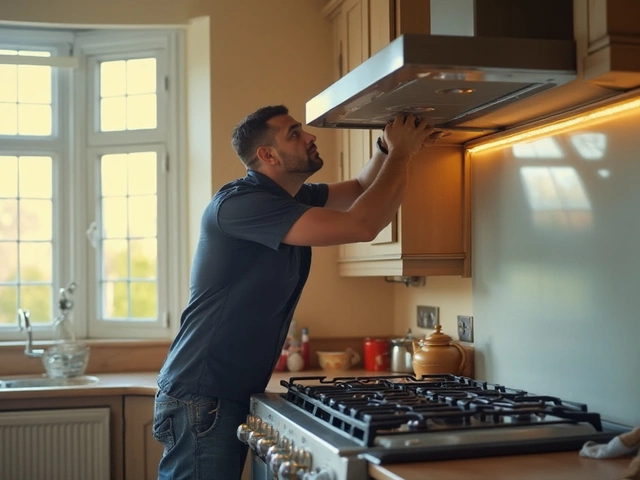Kitchen Extractor Fans – How to Keep Them Working
Cooking creates steam, smell and grease. A good extractor fan pulls it out, stops mould and keeps the kitchen fresh. When the fan slows, makes noise or stops, you’ll notice the air staying heavy. Below are the most common faults and what you can do before calling a technician.
Common Problems & Quick Fixes
Fan won’t turn on. First, check the power. Is the switch on? Try another socket or a different plug. If the fan still doesn’t run, the fuse or circuit breaker may have tripped. Reset it and test again. If power is fine, the motor may be stuck.
Noise or rattling. A loose blade or dust build‑up can cause that. Turn off the fan, remove the cover and give the blades a gentle clean with a soft brush. Tighten any loose screws you find. If the noise persists, the motor bearings might be worn and need replacement.
Weak airflow. Grease buildup on the fan blades or in the duct reduces suction. Clean the blades, then check the duct for blockages. A vacuum cleaner can pull out dust from the duct opening. Occasionally the filter (if your fan has one) needs washing or replacement.
Odour after cooking. This usually means the filter is saturated. Many fans have a charcoal or metal mesh filter you can wash in warm, soapy water. Let it dry completely before reinstalling.
If you feel comfortable, you can replace the motor yourself. Most kitchen fans use a standard 120 V motor that screws into the fan housing. Disconnect the wiring, note which wires go to which terminals, remove the old motor and bolt in the new one. Re‑connect the wires, tighten the housing and test the fan.
When to Call a Professional
Some issues are better left to the experts. If you notice any of these, call a qualified repair service:
- The fan stops intermittently even after checking the power.
- You smell burning or see smoke when the fan runs.
- Electrical wiring looks damaged or frayed.
- The fan is installed behind a cabinet and you can’t safely reach the motor.
- You’re not comfortable working with electricity.
A professional will test the motor, replace faulty parts, and ensure the wiring meets safety standards. In Rugby, our technicians can usually fix most fan problems in under an hour, and they bring the correct replacement motor if needed.
Regular maintenance keeps the fan humming quietly. Clean the blades and filter every few weeks, check the duct for blockages once a year, and give the motor a quick visual inspection for dust. A little upkeep saves you from a costly replacement later.
Bottom line: if the fan is making noise, losing power or airflow, start with a simple clean and power check. When those steps don’t help, either replace the motor yourself (if you’re handy) or call a local repair service to avoid electrical hazards. Keeping your kitchen extractor fan in shape means a fresher kitchen and fewer headaches while you cook.






